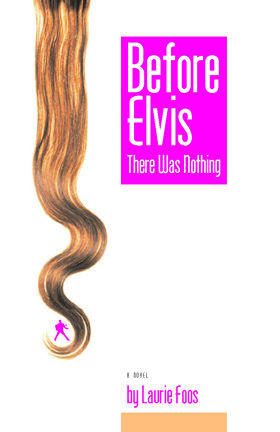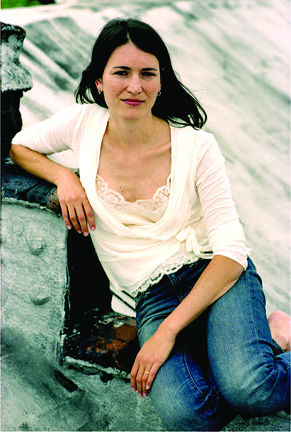Fiction Reviews – June 2005
"Before Elvis There Was Nothing, by Laurie Foos; and "The History of Love," by Nicole Krauss.


Before Elvis There Was Nothing
By Laurie Foos
Coffee House Press, $14.00
Obsessed as we Americans are with the extraordinary, we tend to deify the famous, the beautiful—just about anyone who strikes our collective attention. Even if they haven’t done anything noteworthy, these icons are central to the national conversation, their fortunes and romances more familiar to many people than those of families or neighbors.
Cass, the heroine of Laurie Foos’s deft and surreal new novel Before Elvis There Was Nothing, is literally born into the celebrity bug—she’s named after Mama Cass, thanks to the Mamas and the Papas song playing in the car as her mom, in labor, was being driven to the hospital. Throughout her life, Cass is terrified of, and unable to eat, ham sandwiches. She tells people she’s Jewish. As an adult, Cass’s life is driven by those twin forces of beauty and obsession. She’s grown up to be a devastatingly gorgeous woman; her closest friend is her agoraphobic sister Lena (after Horne), who’s kept herself shut inside ever since their Elvis-crazy parents up and left in the middle of the night a decade ago, and who has spent her life cataloging every last thing her parents left behind, from toenail clippings to King-related kitsch. Cass works as a hair-replacement technician—a beauty-industry job inspired (no less than Lena’s condition is) by her mother, whose hair fell out in clumps after the birth of her children.
One of Foos’s major strengths is an ability to portray the oddly deep connection between celebrity, culture and family. The looming presence of the parents in this story, even as absent characters, calls to mind Aimee Bender’s An Invisible Sign of My Own. Though the mother in that story is intrusively present, and Cass’s parents are defined by their absence, the overwhelming effect of the parent has a similar emotional effect on the two women. They’re left somewhat paralyzed, unable to do anything without wondering what their parents would think.
Before Elvis is one of the smarter dissections of our appearance-obsessed culture you’ll find. Initially, Cass faces constant objectification—fast food workers catcalling, clients idolizing her for her looks, her boss using her beauty as a marketing tool—and it’s a burden seemingly as crippling as the phobia suffered by her sister. However, when Cass starts to grow a horn from her forehead, she learns what it is like to truly be an outsider, not just someone who’s really good looking. The inexplicable horn baffles her dermatologist, and Cass starts to wonder how she’s supposed to “take care of business” (Elvis’s words to live by, as well as hers) with this new distraction. Foos’s writing here takes a turn for the darker and odder, ably capturing the loneliness of those who are isolated by appearances.
Throughout the novel, the facts of Elvis’s rise, decline and death are entwined with Cass’s own thoughts and decisions; the nuances and details of both lives provide a glimpse at the destructive power of attention, and at how quickly the things we celebrate are twisted into those we gawk at. —Julia Carlis
The History of Love
By Nicole Krauss
W.W. Norton, $23.95
Long ago, in his native Poland, Leo Gursky fell deeply in love with a girl named Alma. They were inseparable until, at the beginning of World War II, she was sent away to America; ensuing circumstances sadly thwarted their young love. Leo survived the Holocaust and made his own way across the Atlantic, but to do so he had to effectively disappear, coming to America a dazed and rootless young man.
In present-day New York, Leo—a retired locksmith who feels increasingly that his days are numbered—is still struggling to be recognized. Imposing his lingering existence on the strangers around him has become a crucial element of his daily routine. He makes a production of dropping his change on the floor at Starbucks; he poses nude for a community art class; his main concern is that he not die on a day on which no one has seen him. And Leo, a writer as well, also begins to chronicle that first love, thus attempting to capture the life and the history that have seemed invisible for so long.
Sure, it sounds a bit heavy. Yet to Nicole Krauss’s great credit, she maneuvers Leo’s character away from its frightening downer-potential, bringing to life one of the most wryly endearing and off-the-page-authentic voices you’ve encountered. Leo’s poignant, often hilarious ruminations ring piercingly true, and they beautifully showcase Krauss’s expansive imagination. You’ll never look at little old men the same way.
As though that weren’t enough, Krauss also intersperses the story of Alma Singer, a quirky 14-year-old named after the heroine in her parents’ favorite book, conveniently also titled The History of Love. Between learning how to kiss, dealing with a delusional little brother, and other standard adolescent quandaries, she’s also wrestling with the emotional fallout of her much-beloved father’s death. Krauss’s knack for eccentric details and knowing sensitivity infuse her prose here, as Alma navigates the awkward experiences of being a teenager while trying to coax her mother out of her sadness.
Naturally, these two stories are bound to intersect; Krauss has devised a deliciously convoluted common link between Leo and Alma, using the book-within-the-book to stretch across time, language, nations and generations. It, like the novel itself, is a whimsical, wistful epic that gradually unbraids several intertwined mysteries, and the climaxes of both texts come together with an effortless click and a sigh of wonder. As has been pointed out extensively, there are stylistic similarities here to the work of Krauss’s fiancé, Jonathan Safran Foer (and the two of them are perilously close to being young modern lit’s most overexposed power couple). But really, don’t let that detract from Krauss’ undeniable talent: this is complex, inventive storytelling at its best. —Laura Paisley